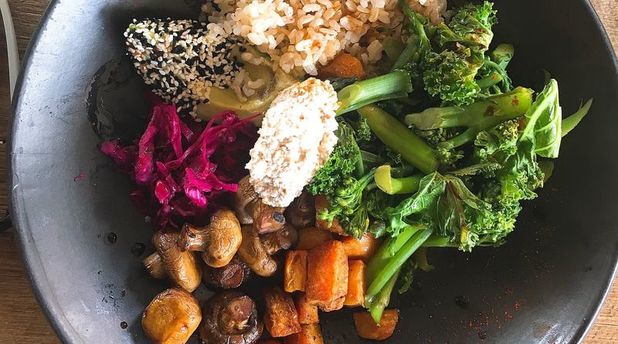|
If you are food lover on Instagram, it is highly likely you’ve seen a nourish plate or ‘macro’ bowl. With their beautiful display of colour and variety, these bowls not only look beautiful but they are also a good source of nutrition. You can pick and mix from a variety of proteins, carbs, vegetables and fats. Take a look at some of our favourite macro inclusions!
CHOOSE 3-5 NON STARCHY VEGETABLES (1-2 cups) Grated carrot Cucumber ribbons Roasted Brussels sprouts Steamed green beans Salad greens Strips of capsicum (red/green/yellow) Sautéed mushrooms Zucchini noodles Asparagus spears Cherry tomatoes Steamed broccoli Mashed pumpkin Steamed grated cauliflower (cauliflower rice) CHOOSE 1 PROTEIN (approx. 100-150g): Lean chicken Lamb strips Marinated tofu Smoked salmon Tinned tuna Lentils/Chickpeas/Kidney Beans CHOOSE 1 GRAINS/CARBS (approx. 1/2 cup): Roasted sweet potato Corn kernels Brown rice Quinoa Roast potato Buckwheat noodles Freekeh Lentils/Chickpeas/Kidney Beans (if not chosen as protein) CHOOSE 1 FAT (approx. 1-2 TBS): Sliced avocado Cashews Feta Roasted almonds Toasted sunflower seeds Pepitas Grated cheese EXTRAS: Olives Hummus Olive Oil Beetroot dip Tahini dressing Herbs Combine on a plate or a bowl and ENJOY!
1 Comment
Jenelle Croatto APD
We all know that nourishing, wholefoods are great for our physical health, but have you ever stopped to wonder what you should eat for a healthy brain? The brain, like all organs in the body needs the right balance of nutrients to function at its best – and to boot, nutrition science has consistently shown a link between the foods we eat, how we feel and even our mood. Highly processed foods, rich in refined sugars and saturated fat, have been associated with an increased risk of depression and anxiety; whereas nutrient dense diets based on real, wholefoods (akin to the Mediterranean diet) have shown a reduced risk. While it’s far reaching to say diet can cure a low mood, it can certainly help you feel more vibrant and to be your most healthy self. Vitamin D Low levels of vitamin D have been linked with depression, and with the sun being a major source of this nutrient; it’s thought that reduced sunlight exposure over the winter months may contribute to the winter blues. Dietary sources of vitamin D are scare, but two rich sources include oily fish e.g. salmon and sardines, and (this will surely surprise you) mushrooms that have been exposed to sunlight! Just 100g that have been left in the sun for an hour will give you 100% of your vitamin D needs. Amazing! Omega 3 Fats Great for heart health and also your brain! Fish is the number one dietary source, with smaller amounts found in eggs, lean red meats, walnuts and chia seeds. Leafy Greens No one will argue that your greens are great for your health, but did you know they can help lift your mood? Leafy greens are rich in folate, which can support good mood by boosting levels of serotonin, a neurotransmitter that makes us feel happy. Low-GI Carbs Our brain is fuelled by blood glucose, and it functions at its best when there is a slow and steady supply. Opt for low GI carbohydrates e.g. sweet potato, wholegrains and quinoa to give you sustained energy throughout the day and pass on refined, processed carbs which only lead to big peaks and troughs in blood glucose levels, affecting both your mood and energy levels. Jenelle Croatto APD
There is no need to give up your social life when following a Low FODMAP Diet. With a few handy tips up your sleeve, you can still socialise over food and say “yes” to that dinner invite. CHECK THE MENU AHEAD OF TIME Many restaurants display their menus on their website and/or they can often be found on various restaurant rating websites or apps. If you can, peruse the menu beforehand so you can look for meals that contain low FODMAP ingredients. If it’s not possible to find the menu, try calling the restaurant ahead of time. Being organised and prepared can also reduce stress, which is another common cause of IBS. LOOK OUT FOR SAUCES, DIPS & DRESSINGS Garlic and onion often sneak their way into various meals through sauces, dips and dressings. If it’s not possible to order these without the added garlic or onion, ask if you can have these to be provided on the side. WHEN IN DOUBT – GO FOR SIMPLE If your FODMAP detective skills find no suitable option, try ordering a few side dishes or ask for a serve of meat (or plant protein) and steamed vegetables or salad. REDUCE YOUR FODMAP LOAD If you have plans to eat out, lower your total FODMAP load by eating lower FODMAP meals/snacks before going out to eat. This way, if you happen to mistakenly (or by no fault of your own) eat higher FODMAP foods you may not exceed you personal FODMAP threshold. REMEMBER – A Low FODMAP Diet is not a NO FODMAP Diet. Do your best to eat lower FODMAP foods and remember to also enjoy the experience of eating out. |
News FEEDFitness, Energy, Education & Diet Archives
June 2020
Categories
All
|



 RSS Feed
RSS Feed